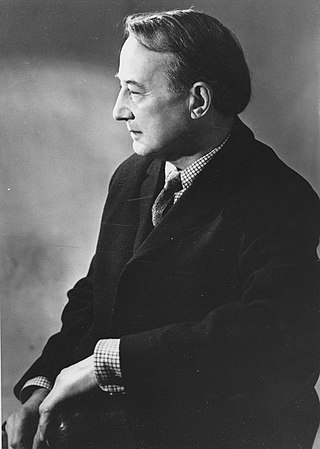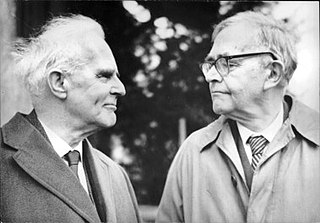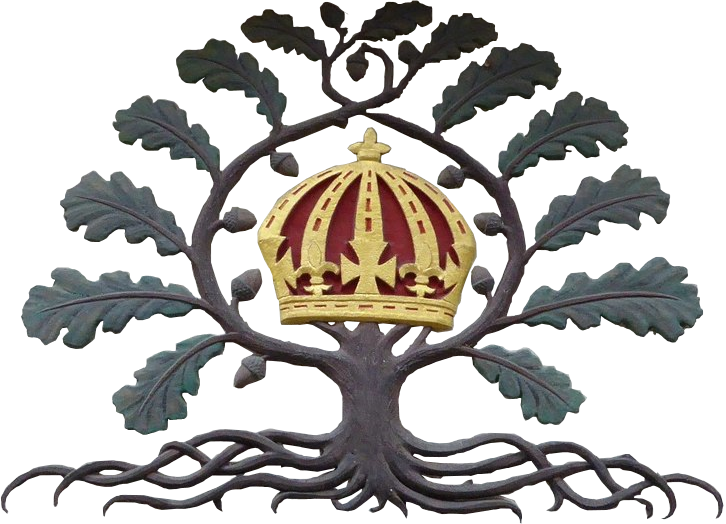Traditionalism, in the context of 19th-century Catholicism, refers to a theory which held that all metaphysical, moral, and religious knowledge derives from God's revelation to man and is handed down in an unbroken chain of tradition. [1] It denied that human reason by itself has the power to attain to any truths in these domains of knowledge. [2] It arose, mainly in Belgium and France, as a reaction to 18th-century rationalism and can be considered an extreme form of anti-rationalism. [1]
Its chief proponents were Joseph de Maistre, Louis de Bonald, and Hugues Felicité Robert de Lamennais. [1] Their doctrines were advocated in a modified form by Louis Eugène Marie Bautain, Augustin Bonnetty, Casimir Ubaghs, and the philosophers of the Louvain school. [3] The fundamental distrust of human reason underlying traditionalism was eventually condemned in a number of papal decrees and finally ruled out by the dogmatic constitution Dei Filius during the First Vatican Council in 1870. [2]
Gospel originally meant the Christian message, but in the 2nd century it came to be used also for the books in which the message was reported. In this sense a gospel can be defined as a loose-knit, episodic narrative of the words and deeds of Jesus, culminating in his trial and death and concluding with various reports of his post-resurrection appearances. Modern biblical scholars are cautious of relying on the gospels uncritically, but nevertheless, they provide a good idea of the public career of Jesus, and critical study can attempt to distinguish the original ideas of Jesus from those of the later Christian authors.

René Descartes was a French philosopher, scientist, and mathematician, widely considered a seminal figure in the emergence of modern philosophy and science. Mathematics was central to his method of inquiry, and he connected the previously separate fields of geometry and algebra into analytic geometry. Descartes spent much of his working life in the Dutch Republic, initially serving the Dutch States Army, later becoming a central intellectual of the Dutch Golden Age. Although he served a Protestant state and was later counted as a Deist by critics, Descartes was Roman Catholic.

The Age of Enlightenment or the Enlightenment, also known as the Age of Reason, was an intellectual and philosophical movement that occurred in Europe in the 17th and 18th centuries, with global influences and effects. The Enlightenment included a range of ideas centered on the value of human happiness, the pursuit of knowledge obtained by means of reason and the evidence of the senses, and ideals such as natural law, liberty, progress, toleration, fraternity, constitutional government, and separation of church and state.
Monophysitism or monophysism is a Christological term derived from the Greek μόνος and φύσις. It is defined as "a doctrine that in the person of the incarnated Word there was only one nature—the divine".
In philosophy, rationalism is the epistemological view that "regards reason as the chief source and test of knowledge" or "any view appealing to reason as a source of knowledge or justification". More formally, rationalism is defined as a methodology or a theory "in which the criterion of truth is not sensory but intellectual and deductive".
Empirical evidence for a proposition is evidence, i.e. what supports or counters this proposition, that is constituted by or accessible to sense experience or experimental procedure. Empirical evidence is of central importance to the sciences and plays a role in various other fields, like epistemology and law.
Fideism is an epistemological theory which maintains that faith is independent of reason, or that reason and faith are hostile to each other and faith is superior at arriving at particular truths. The word fideism comes from fides, the Latin word for faith, and literally means "faith-ism". Philosophers have identified a number of different forms of fideism. Strict fideists hold that reason has no place in discovering theological truths, while moderate fideists hold that though some truth can be known by reason, faith stands above reason. Fideism is historically associated with some forms of Protestantism, but is rejected by the Catholic Church as heretical.

Michael Joseph Oakeshott FBA was an English philosopher and political theorist who wrote about the philosophies of history, religion, aesthetics, education, and law.
Critical rationalism is an epistemological philosophy advanced by Karl Popper on the basis that, if a statement cannot be logically deduced, it might nevertheless be possible to logically falsify it. Following Hume, Popper rejected any inductive logic that is ampliative, i.e., any logic that can provide more knowledge than deductive logic. In other words if we cannot assert it logically, we should at the least try to logically falsify it, which led Popper to his falsifiability criterion.

The brothers of Jesus or the adelphoi are named in the New Testament as James, Joses, Simon, Jude, and unnamed sisters are mentioned in Mark and Matthew. They may have been: (1) the sons of Mary, the mother of Jesus, and Joseph, (2) sons of Mary the wife of Cleophas and sister of Mary, the mother of Jesus; or (3) sons of Joseph by a former marriage. While option 1 is described as the "most natural inference" from the New Testament, those who uphold the perpetual virginity of Mary reject the idea of biological brethren and maintain that the brothers and sisters were either cousins of Jesus or children of Joseph from a previous marriage.
The Counter-Enlightenment refers to a loose collection of intellectual stances that arose during the European Enlightenment in opposition to its mainstream attitudes and ideals. The Counter-Enlightenment is generally seen to have continued from the 18th century into the early 19th century, especially with the rise of Romanticism. Its thinkers did not necessarily agree to a set of counter-doctrines but instead each challenged specific elements of Enlightenment thinking, such as the belief in progress, the rationality of all humans, liberal democracy, and the increasing secularisation of society.

The Catechetical School of Antioch was one of the two major centers of the study of biblical exegesis and theology during Late Antiquity; the other was the Catechetical School of Alexandria. This group was known by this name because the advocates of this tradition were based in the city of Antioch, one of the major cities of the ancient Roman Empire.

The Traditionalist or Perennialist School is a group of 20th- and 21st-century thinkers who believe in the existence of a perennial wisdom or perennial philosophy, primordial and universal truths which form the source for, and are shared by, all the major world religions.

Jaroslav Jan Pelikan Jr. was an American scholar of the history of Christianity, Christian theology, and medieval intellectual history at Yale University.

Heinrich Emil Brunner (1889–1966) was a Swiss Reformed theologian. Along with Karl Barth, he is commonly associated with neo-orthodoxy or the dialectical theology movement.

Traditionalist conservatism, often known as classical conservatism, is a political and social philosophy that emphasizes the importance of transcendent moral principles, manifested through certain natural laws to which society should adhere prudently. Traditionalist conservatism is based on Edmund Burke's political views. Traditionalists value social ties and the preservation of ancestral institutions above excessive individualism.
Atharism or Atharī theology, otherwise referred to as Traditionalist theology or Scripturalist theology, is one of the main Sunni schools of Islamic theology. It emerged as a school of theology in the late 8th century CE from the scholarly circles of Ahl al-Hadith, an early Islamic religious movement that rejected the formulation of Islamic doctrine derived from rationalistic Islamic theology (kalām) in favor of strict textualism in interpreting the Quran and the ḥadīth. The name derives from "tradition" in its technical sense as a translation of the Arabic word athar. It's adherents are referred to by several names such as "Ahl al-Athar", "Ahl al-Hadith", etc.
Transcendental Humanism in philosophy considers humans as simultaneously the originator of meaning, and subject to a larger ultimate truth that exists beyond the human realm (transcendence). The philosophy suggests that the humanistic approach is guided by “accuracy, truth, discovery, and objectivity” that transcends or exists apart from subjectivity.

Essai sur les mœurs et l'esprit des nations is a work by the French writer, historian, and philosopher Voltaire, published for the first time in 1756. It discusses the history of Europe before Charlemagne until the dawn of the age of Louis XIV, also addressing the colonies and the East.
In traditionalist philosophy, desacralization of knowledge or secularization of knowledge is the process of separation of knowledge from its perceived divine source—God or the Ultimate Reality. The process reflects a paradigm shift in modern conception of knowledge in that it has rejected divine revelations as well as the idea of spiritual and metaphysical foundations of knowledge, confining knowledge to empirical domain and reason alone. Although it is a recurrent theme among the writers of the Traditionalist school that began with René Guénon, a French mystic and intellectual who earlier spoke of "the limitation of knowledge to its lowest order", the process of desacralization of knowledge was most notably surveyed, chronicled and conceptualized by the Iranian philosopher Seyyed Hossein Nasr in his 1981 Gifford Lectures that were later published as Knowledge and the Sacred.